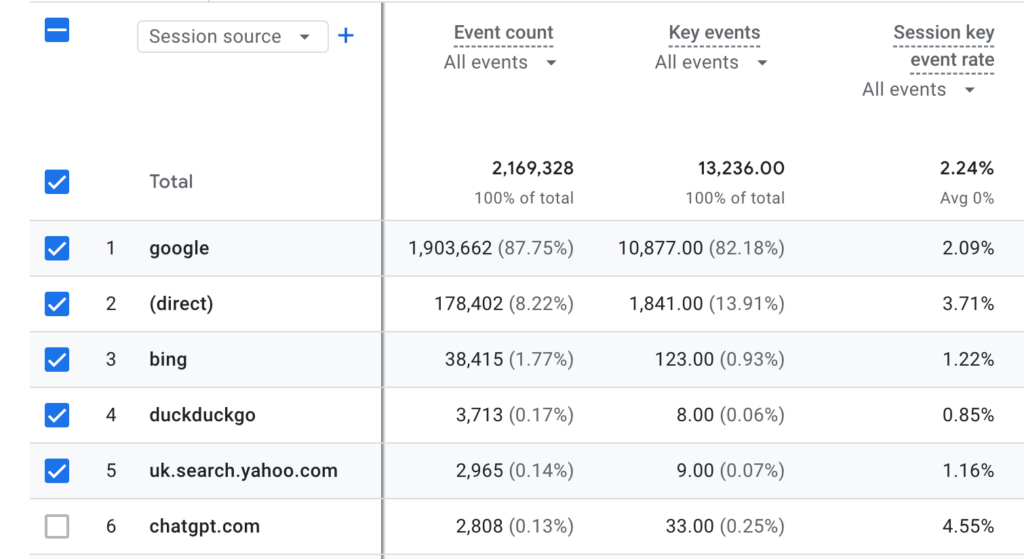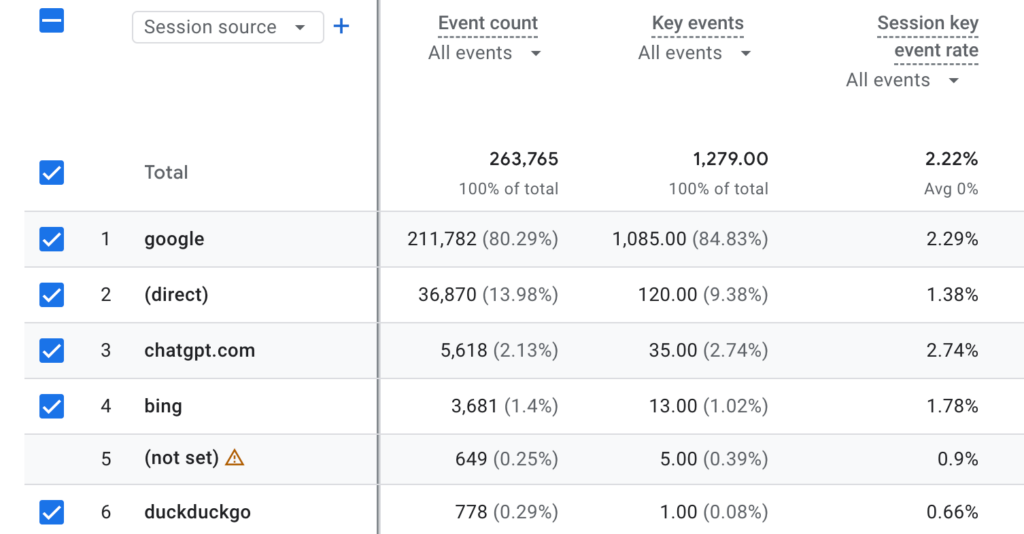Google and Bing dominate the search engine market, each serving vast numbers of users with varying preferences. Statistics from 2025 reveal that Google continues to lead with a substantial majority, engaging billions globally, while Bing maintains a smaller, yet significant, user base.
This article provides a detailed comparison of user statistics for both search engines in 2026.
How Many People Use Bing vs. Google
About 4.9 billion people use Google, and 164 million use Bing monthly.
However, the numbers are changing quickly. Here’s 2024 and 2025 compared to help you understand that.
In 2024, 82% of internet users search on search engines at least once every month. As of April 2024, there were around 5.44 billion internet users, according to Statista. That meant approximately 4.5 billion people are searching on the internet every month.
In 2024, Google commanded 90.91% of the global search engine market. In contrast, Bing, which is operated by Microsoft, held a much smaller portion of the market. Reports from 2024 suggested that Bing’s market share hovered around 3.64%. The other search engines, including YANDEX, Baidu, Yahoo!, and DuckDuckGo, share the rest of the market. The market share is different in each country. For example, in the United States, Google had about 86% of the market share, and Bing had about 8%.
However, due to AI engines like ChatGPT, Google’s share of the search market has declined a bit in 2025, by about 9%. To be clear, Google confirmed that it handled over 14 billion searches per day in March 2025. In contrast, ChatGPT processed around 2.5 billion messages per day, with about 887 million queries estimated to be equivalent to a typical Google search.
It should be noted that several people use Google 3-4 times a day, and some people don’t search for anything for some days, resorting to social media platforms such as Tiktok and Instagram to find businesses or AI platforms like Gemini and ChatGPT for information – this is only a small percentage of search engine users, though.
So, while Google now holds about 80% of the search market, ChatGPT is estimated to hold around 13% while Bing seems to have struggled the most with the influx of AI tools.
Google vs. Bing vs. ChatGPT for Marketing
The real question is not “how many people are using Bing vs Google”, but which engine is more likely to provide traffic and business visibility. Let’s start with paid search then we will look at organic search/traffic from each, as well as their conversion rates.
Paid Search on Bing vs Google
In 2025, Bing generated a little over $14 billion in ad revenue. In contrast, Google Search generated over $252 billion in ad revenue. Both companies achieved growth in ad revenue in 2023, with Google recording a 9.25% increase and Bing recording over a 10% increase.
Either platform works for advertising, though you need to factor in the number of people searching on Google, which will result in more visibility for your brand. However, that comes at a higher cost.
Typically, the cost-per-click (CPC) on Bing Ads is lower compared to Google Ads due to less competition. This can be an attractive option for small to medium-sized enterprises or those with limited advertising budgets who still want to achieve significant impact.
Each platform’s geographic performance should be considered as well; while Google maintains a strong presence globally, Bing’s market share is quite low in some countries, so it may not make a lot of sense to invest in advertising (notably in Nigeria – 0.5% market share –, India and most of Asia – Baidu has a higher market share than Bing in Asia). However, Bing still has a good hold on some markets, including Canada (6%) and Germany (5.47%).
There are no verified statistics on the conversion rates of ads for either platform though some sites estimate Bing Ads’ conversion rate to be 2.94% and Google Ads’s conversion rate to be 3.75%.
There are several factors that influence conversion rates, including:
- The quality of your landing page
- Bid/ad strategy
- Ad creatives
- Budget
- Audience and industry
Regardless, given the number of fewer users on Bing, if your business is focused on the mass market, Google might be able to deliver more conversions.
Google vs. Bing vs ChatGPT Search Conversion Rates in 2026
I have extensively tested conversion rates of Google, Bing, and ChatGPT search across several websites and the results have been relatively consistent, showing:
- Google brings in the most customers
- ChatGPT has a higher conversion rate than Google
- Bing hovers around a 10%
Here’s the Google Analytics one of the sites showing a 2.64% conversion rate from Google, 1.96% conversion rate from Bing and 4.78% conversion rate from Chatgpt

For another site, Google’s conversion rate was 2.09%, Bing’s was 1.22%, and ChatGPT was 4.55%.

Both sites were primarily targeted at the UK. For a site targeting the US, it was a different story. Here, Google had a conversion rate of 2.29%, ChatGPT had a rate of 2.74%, and Bing had a rate of 1.78%.

Here’s a comparison for easy view.
| Site One | Site Two | Site Three | Average | |
| 2.64% | 2.09% | 2.29% | 2.34% | |
| Bing | 1.96% | 1.22% | 1.78% | 1.65% |
| ChatGPT | 4.78% | 4.55% | 2.74% | 4% |
This shows that AI traffic converts about 2 to 3 times more than search traffic, and was confirmed in a study by Microsoft.
However, keep in mind the volumes – with search still bringing in the bulk of the visitors, having a 70/30 focus would be best rather than focusing on ChatGPT only and neglecting regular search engines.
That said, most strategies that work for Google search optimization also work for AI optimization, but that’s a topic for another post.
Google vs. Bing vs. ChatGPT: Site Ranking
All three use complex algorithms and processes to decide what URLs and brands to suggest to users.
Google assesses the quality and quantity of links to a page, site reputation as a whole, content, and the user experience to determine a rough estimate of the website’s importance. Bing uses a similar approach – site reputation, user engagement, and user location to influence the relevance and type of content presented to users on each platform.
ChatGPT doesn’t choose URLs or brands the way a search engine like Google does. It doesn’t crawl the web or evaluate websites. Instead, it generates responses based on patterns it learned during training from a mixture of publicly available text, licensed data, and human-created examples. From that data, it learned which brands, tools, and websites are commonly mentioned in different contexts.
When ChatGPT suggests a brand or a tool, it’s predicting what usually fits the type of question being asked, based on how similar questions were answered in the data it was trained on. Sometimes ChatGPT accesses the live web and can then reference current websites/links.
That said, with all three, well-known brands are more likely to be suggested because they appear more frequently in online discussions, articles, and guides. The more a brand is mentioned across the web and in authoritative sources, the more likely it is that Google/Bing will rank it, or ChatGPT will have learned to associate that brand with certain use cases.
So for all three, you must ensure the following:
- Brand presence in online communities
- Strong backlinks
- Great content and authors
- Good technical and site crawlability
So, Which Is Better: Google, Bing, or ChatGPT?
When people ask whether Google or Bing is “better,” it usually comes down to what they need and how they search. Google still dominates traditional search, while Bing maintains a significant presence, especially in the business sector, and ChatGPT continues to grow at a steady rate.
The best would depend on your audience (which do they use more) and your business (better-converting channel).
Nevertheless, if you want to stay visible across search engines and AI tools, you need SEO and strong Digital PR. Digital PR here is getting your brand mentioned in the right publications, industry sites, and trusted sources that AI tools are more likely to reference.
That’s where Konvart helps. Our SEO tools support keyword research, technical optimisation, local SEO, content optimisation, link building, and digital PR. We also provide tools that not only help you find relevant outreach opportunities but also assist you in reaching out to them and earning high-quality mentions.
Konvart makes it easier to improve visibility across Google, Bing, and AI platforms like ChatGPT. Sign up today to get started.

